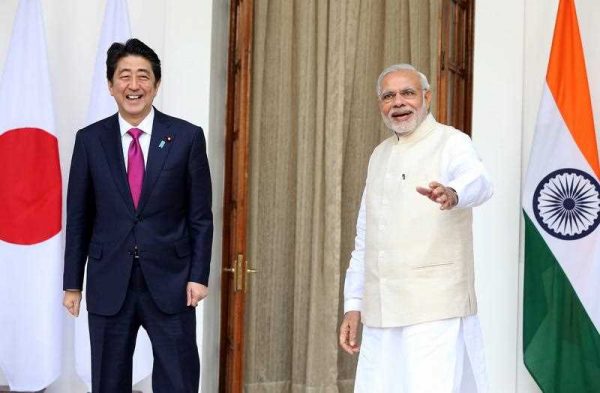The agreement indicates that the Japanese government has a strong will to support India’s economic rise. Ever since India initiated favourable economic policies in the 1990s, its economy has seen unprecedented growth. But this rapid development is not without its weaknesses. The shortage of energy resources is one. India is even more reliant than Japan on oil imports, with the total amount of crude oil imported by India overtaking that of Japan in 2013. To maintain its rapid economic development, India needs more energy resources. Nuclear energy appears to be the only option that could fulfil India’s energy needs without producing large-scale carbon emissions.
Japan’s cooperation is crucial for exploring this option. About 80 per cent of vital nuclear plant components are made in Japan meaning India is also dependent on Japan for nuclear deals concluded with other countries, such as with the United States and France. Once the Japan–India nuclear deal is concluded, India will be able to access huge energy resources. This should enable India to maintain rapid development and give it a valuable opportunity to make a positive impact on the region.
Despite some concerns otherwise, the India–Japan agreement is not a setback to the nuclear non-proliferation regime. While India is not a party to the Treaty on the Non-Proliferation of Nuclear Weapons, given its past record there is no indication that India will proliferate or use its nuclear technologies against other countries. And, even if the international community officially recognises India as the ‘sixth nuclear great power’ — along with US, Russia, the United Kingdom, France, China — this will not necessarily prompt other great powers to claim the ‘seventh’ or ‘eighth’ position in the near future.
South Korea, Taiwan, Brazil, Argentina and South Africa were all in the past possibilities for another nuclear power. But they have already ceased their nuclear weapon development programs and are unlikely to assert such claims. North Korea, Pakistan and Iran have been involved with the nuclear black market and as such the international community is now unwilling to accept them as recognised nuclear powers. Israel is also unlikely to push for legitimation of it nuclear status as that could push neighbouring countries in developing their own nuclear programs.
Historically, both Japan and India share a similar nuclear deterrence policy and a commitment to the total elimination of nuclear weapons. During China’s nuclear tests in 1964, both Japan and India requested that the US extend its nuclear umbrella deterrence policy in Asia. While Japan’s case was heard, India pleaded in vain. So, while Japan could afford to cease its joint nuclear development negotiation with West Germany, India could not cease their own nuclear development plans. Developing nuclear weapons was seen as the only strategic option left for India to mitigate nuclear risk. When viewed from this angle, both Japan and India shared a similar need for nuclear deterrence despite their wish for the global elimination of nuclear weapons.
Still there has been a relatively strong public opposition in Japan to India’s nuclear policy and particularly its nuclear tests in 1998. But the recently concluded civil nuclear deal is testimony to the fact that Japanese government has accepted India as a responsible nuclear power and that future Japan–India relations will be stable.
There is also a strategic element to the India–Japan civil nuclear deal. The agreement provides a counter-balance to China’s expanding activities in the Indo-Pacific region. Both Japan and India share similar anxieties about China’s recent assertiveness. And both countries are concerned with the changing US–China power balance. Japan and India need to cooperate to fill the gap left by a declining US presence in the region The urgency of this is underlined by the fact that China is exporting nuclear plants to Pakistan.
The only matter in the way of a burgeoning civil nuclear agreement in the future is Japanese concerns about the likelihood of another nuclear test by India. While another test might be a military requirement for India to maintain and update its nuclear deterrence capability, it will undermine the agreement. In that case, Japan will need to cease nuclear cooperation with India. But if India respects Japan’s unease towards nuclear testing then Japan–India nuclear cooperation could provide sustained benefits for India, Japan and the region.
Satoru Nagao is a research fellow at The Tokyo Foundation and the Japan Forum for Strategic Studies and a lecturer in national security at Gakushuin University.


I would not agree with this author’s conclusion that nuclear energy is India’s only non carbon dioxide producing option. The production of nuclear fuel requires the use of fossil fuels. So does the transport of the fuel to the site where it will be used.
Solar and wind energy, however, are truly non carbon dioxide creating. There must be places in India where these energy sources can be cultivated.
Nuclear energy also leaves one with other potential dangers. Where/how does one store the spent fuel safely? In pools of water that must be kept cool? This requires fossil fuel? Events at Fukushima have shown the dangers that such storage present. India’s eastern coastline was struck by the huge tsunami created by the Indonesian earthquake in 2004. What would happen to stored spent fuel in such a situation?
Modi and Abe should get their heads out of the clouds when it comes to helping India develop the energy sources it needs. Their successors may well rue the day that these decisions were made.
Why is it that politicians have not learn from nuclear disasters like Three Mile Island, Chernobyl, and Fukushima?